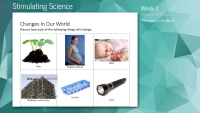Stimulating Science
Types of Change
Rationale
Everything in our physical world changes. Understanding how and why these changes occur helps us in our daily lives.
Investigation Into
- How to make predictions and scientific observations.
- How living things change and what they need to live.
- How everyday materials can be changed or combined to make objects.
- How seasonal changes can affect everyday life.
- The sources of sound.
Essential Questions
- How can we use experiments to learn about the world around us?
- How do living things change and what do they need to live?
- How do the seasons affect our lives?
- How can we use Earth's resources sustainably?
- How are sounds made and how do we hear them?
Future Action
Students will be able to make predictions and scientific observations to test questions that they have. They will use what they have learnt about what living things need to help care for pets or gardens. Students will be able to identify how materials have been changed or combined to make objects that they use. They will use what they have learnt about the impact of the seasons on their lives to prepare activities and consider appropriate clothing. Students will be able to identify the sources of sounds in their everyday life, and different objects that they push and pull.
Pretesting and Familiarisation
The Concept Of Change
Your students will be immersed into changes in the world around them.
Your students will be immersed into changes in the world around them.
Immersion
Your students will be immersed into science as they participate in experiments.
Your students will be immersed into science as they participate in experiments.
Pretest
Your students will complete a pretest about thinking and acting like a scientist.
Your students will complete a pretest about thinking and acting like a scientist.
Introducing The Unit
Your students will learn what they will be doing during this learning sequence.
Your students will learn what they will be doing during this learning sequence.
Glossary Of Change
Your students will learn verbs associated with science and what happens when 'ing' and 'ed' are added.
Your students will learn verbs associated with science and what happens when 'ing' and 'ed' are added.
Habit of Mind: Questioning and Posing Problems
Your students will practise developing 'easy thinking' questions and 'interesting thinking' questions.
Your students will practise developing 'easy thinking' questions and 'interesting thinking' questions.
Habit of Mind: Gathering Data Through All Senses
Your students will learn about the habit of 'Gathering Data Through All Senses'.
Your students will learn about the habit of 'Gathering Data Through All Senses'.
Learning Opportunities
Biology: Living And Non-Living
Your students will learn the difference between living and non-living things.
Your students will learn the difference between living and non-living things.
Biology: Features And Needs Of Plants
Your students will study the biology of plants as they draw a plant and identify the features and needs of plants.
Your students will study the biology of plants as they draw a plant and identify the features and needs of plants.
Biology: Guess Who
Your students will learn about the features of an animal and provide the rest of the class with clues to guess which animal they learnt about.
Your students will learn about the features of an animal and provide the rest of the class with clues to guess which animal they learnt about.
Earth And Space: Daily Weather
Your students will learn about different weather conditions as they predict the weather for the following day.
Your students will learn about different weather conditions as they predict the weather for the following day.
Earth And Space: Seasons And Months
Your students will learn the seasons as they sing along to the 'Seasons Song'.
Your students will learn the seasons as they sing along to the 'Seasons Song'.
Earth And Space: Celery Experiment
Your students will consider what might happen if there was no freshwater as they conduct an experiment to see how plants absorb water.
Your students will consider what might happen if there was no freshwater as they conduct an experiment to see how plants absorb water.
Chemistry: Observable Properties
Your students will learn about observable properties as they observe properties of everyday objects.
Your students will learn about observable properties as they observe properties of everyday objects.
Chemistry: Making A Bubble Wand
Your students will learn how different materials can be changed or combined to make objects that we use in our lives.
Your students will learn how different materials can be changed or combined to make objects that we use in our lives.
Physics: Forms Of Energy
Your students will learn about different forms of energy.
Your students will learn about different forms of energy.
Physics: Making Sounds
Your students will learn about sound waves as they work in groups to make sounds.
Your students will learn about sound waves as they work in groups to make sounds.
Physics: Push And Pull
Your students will explore the affects of pushing and pulling objects.
Your students will explore the affects of pushing and pulling objects.
Science In Our World
Your students will show what they have learnt during this unit as they work in pairs to find examples of science in the classroom.
Your students will show what they have learnt during this unit as they work in pairs to find examples of science in the classroom.
Demonstration of Understanding
What I Have Learnt About Science
Your students will record what they have learnt during this unit.
Your students will record what they have learnt during this unit.
Future Action
Future Action
Your students will consider scenarios in which they can observe things in their day-to-day lives.
Your students will consider scenarios in which they can observe things in their day-to-day lives.


